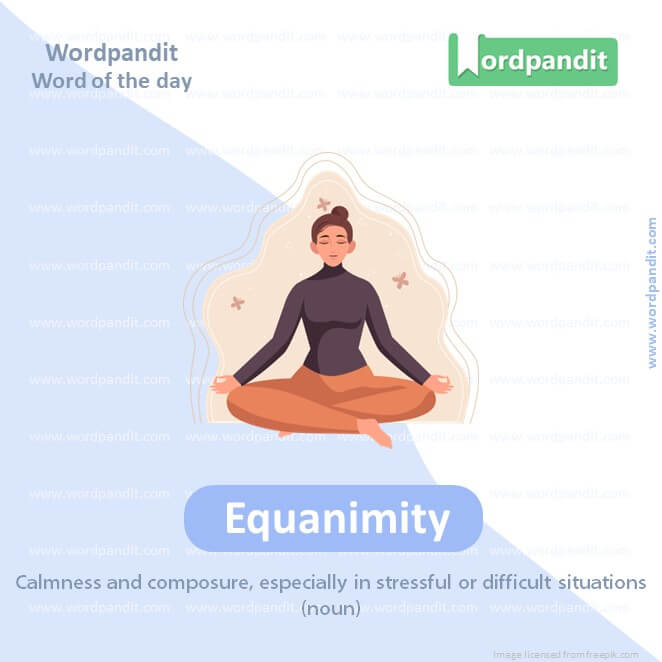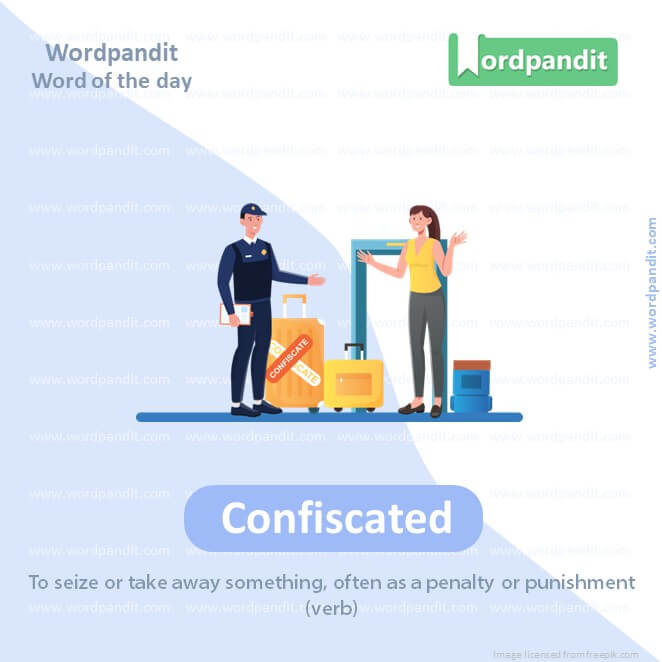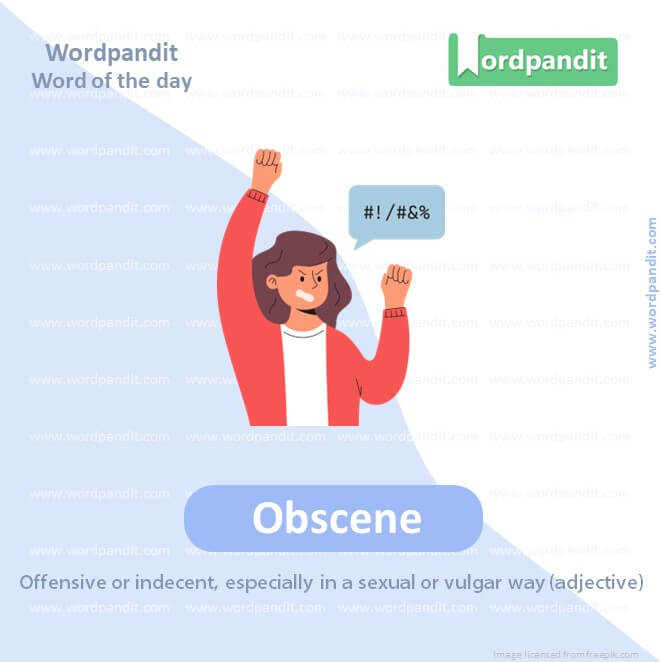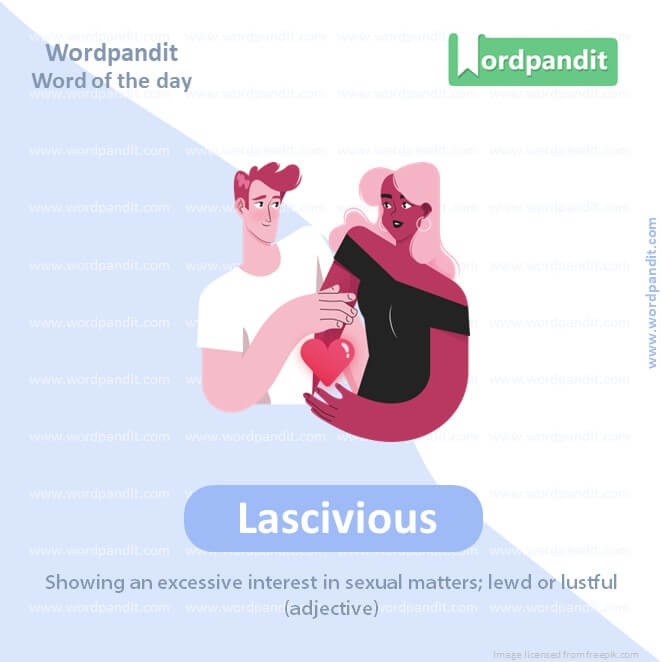Daily Vocabulary Words: List of Daily Used Words in Leading Indian Newspapers
Hi there. Welcome to this special section @ Wordpandit. Our endeavour here is straightforward: highlighting daily vocabulary words that you would come across in leading newspapers in the country. We have included the following newspapers in our selection:
• The Times of India
• The Economic Times
• Hindustan Times
• Mint
• Indian Express
We are putting in extensive work to develop your vocabulary. All you have to do is be regular with this section and check out this post daily. This is your repository of commonly used words; essentially, we are posting a list of daily used words. Hence, this has significant practical application as it teaches you words that are commonly used in leading publications mentioned above.
Visit the website daily to learn words from leading Indian newspapers.

WORD-1: Equanimity
CONTEXT: This manner of accommodating what could potentially be subversive makes it difficult to view the situation with equanimity.
SOURCE: Hindustan Times
EXPLANATORY PARAGRAPH: Equanimity refers to a calm and balanced state of mind, especially in difficult situations. It’s like staying composed and not getting too upset or stressed when facing challenges.
MEANING: Calmness and composure, especially in stressful or difficult situations (noun).
PRONUNCIATION: ee-kwuh-NIM-i-tee
SYNONYMS: composure, serenity, tranquility, poise, calmness
USAGE EXAMPLES:
1. Despite the chaos around her, she faced the situation with equanimity.
2. His equanimity under pressure impressed his colleagues.
3. The meditation practice helped her maintain equanimity in daily life.
4. Leaders are expected to demonstrate equanimity in times of crisis.
WORD-2: Extraneous
CONTEXT: He has noted that awards are based on the “sole criterion” of “musical excellence demonstrated over a significant and sustained career”, and are made with no “extraneous factors influencing” the Academy’s choice.
SOURCE: Hindustan Times
EXPLANATORY PARAGRAPH: Extraneous means something that is unnecessary or irrelevant to the main topic or purpose. It’s like having extra things that don’t really belong or add value.
MEANING: Not essential; unrelated or irrelevant to the main topic or purpose (adjective).
PRONUNCIATION: ik-STREY-nee-uhs
SYNONYMS: irrelevant, unnecessary, superfluous, unrelated, nonessential
USAGE EXAMPLES:
1. The report contained extraneous information that was not needed for the presentation.
2. She deleted the extraneous details to focus on the main points of her argument.
3. The teacher reminded students to avoid including extraneous content in their essays.
4. The discussion veered off track due to extraneous comments from participants.

WORD-3: Malingering
CONTEXT: the president of the Academy remain content with characterising the protesters as giving into personal dislike and malingering, and not take note of their founded social hatred, so evident in the language used by all protesters?
SOURCE: Hindustan Times
EXPLANATORY PARAGRAPH: Malingering refers to pretending to be sick or injured to avoid work or responsibilities. It’s like faking an illness or injury to get out of doing something.
MEANING: Pretending to be ill or injured, especially to avoid work or duties (verb).
PRONUNCIATION: muh-LIN-jer-ing
SYNONYMS: feigning, pretending, faking, simulating, shamming
USAGE EXAMPLES:
1. He was accused of malingering to avoid his military duties.
2. The employee was caught malingering by pretending to have a back injury.
3. She suspected her child of malingering to skip school.
4. Malingering can have serious consequences in professional settings.
WORD-4: Profaning
CONTEXT: As far as Carnatic music is concerned, this would require a critical soiling of its spiritual sources, a profaning of its aesthetics in and through the invocation of its gendered and caste contexts.
SOURCE: Hindustan Times
EXPLANATORY PARAGRAPH: Profaning means showing disrespect or irreverence towards something sacred or holy. It’s like treating something sacred in a disrespectful or offensive manner.
MEANING: Treating something sacred with disrespect or irreverence; desecrating (verb).
PRONUNCIATION: pruh-FEYN-ing
SYNONYMS: desecrating, blaspheming, disrespecting, defiling, violating
USAGE EXAMPLES:
1. Vandalism in the church was seen as profaning the sacred space.
2. His comments about the religious symbol were considered profaning.
3. The act of burning the flag was viewed as profaning national symbols.
4. The artist faced criticism for profaning cultural traditions in his artwork.
WORD-5: Disingenuous
CONTEXT: Krishna has done both, but to award him for his music and not engage with the issues the musician has raised is somewhat disingenuous, and an instance of what Periyar characterised as the self-validating universe of Brahmanism.
SOURCE: Hindustan Times
EXPLANATORY PARAGRAPH: Disingenuous means insincere or dishonest, especially in pretending to be genuine or honest. It’s like pretending to be friendly while actually having ulterior motives.
MEANING: Not sincere or genuine; insincere, deceptive, or dishonest (adjective).
PRONUNCIATION: dis-in-JEN-yoo-uhs
SYNONYMS: insincere, deceitful, dishonest, fake, hypocritical
USAGE EXAMPLES:
1. His apology came across as disingenuous, lacking genuine remorse.
2. She gave a disingenuous smile while hiding her true feelings.
3. The politician’s promises were seen as disingenuous by the public.
4. Disingenuous behavior often leads to mistrust and skepticism.

WORD-6: Confiscated
CONTEXT: A Customs Commissioner in Mumbai recently confiscated and penalised the import of a body massager, on grounds that it could be used as an erotic toy.
SOURCE: Hindustan Times
EXPLANATORY PARAGRAPH:
Confiscated means to take away something by authority, especially as a penalty or punishment. It’s like when the police take away illegal items during a raid.
MEANING:
To seize or take away something, often as a penalty or punishment (verb).
PRONUNCIATION: kuhn-FISK-eyt-ed
SYNONYMS:
seized, impounded, appropriated, expropriated, confiscated
USAGE EXAMPLES:
1. The authorities confiscated illegal drugs during the raid.
2. His phone was confiscated for using it during class.
3. The customs officials confiscated prohibited items at the border.
4. The government confiscated property from tax evaders.

WORD-7: Obscene
CONTEXT: Customs officials have the authority to intercept and seize goods (either imported or exported) deemed obscene. However, what is obscene exactly remains a matter of discussion — between moral and legal frameworks.
SOURCE: Hindustan Times
EXPLANATORY PARAGRAPH:
Obscene means offensive or indecent, especially in a sexual or vulgar way. It’s like content or language that is inappropriate for certain audiences.
MEANING:
Offensive or indecent, especially in a sexual or vulgar way (adjective).
PRONUNCIATION: uhb-SEEN
SYNONYMS:
indecent, vulgar, lewd, offensive, explicit
USAGE EXAMPLES:
1. The movie was rated R for its obscene language and scenes.
2. She was shocked by the obscene graffiti on the wall.
3. His jokes were often considered obscene and inappropriate.
4. The artist faced criticism for creating paintings with obscene imagery.
WORD-8: Accordance
CONTEXT: A notification passed under the Customs Act in 1964 prohibits the import of obscene articles in accordance with section 292 of the Indian Penal Code (IPC), which prohibits the dissemination of obscene material.
SOURCE: Hindustan Times
EXPLANATORY PARAGRAPH:
Accordance refers to being in agreement or conformity with something, like following rules or guidelines. It’s like when you act according to what is expected or required.
MEANING:
Compliance or agreement with something; in accordance with (noun/phrase).
PRONUNCIATION: uh-KAWR-dns
SYNONYMS:
agreement, compliance, conformity, harmony, accordance with
USAGE EXAMPLES:
1. The decision was made in accordance with company policies.
2. His actions were not in accordance with the law.
3. The project was completed in accordance with the timeline.
4. The terms of the contract were followed in accordance with the agreement.
WORD-9: Obscenity
CONTEXT: It also called for more defined contours of obscenity, and increased punishment.
SOURCE: Hindustan Times
EXPLANATORY PARAGRAPH:
Obscenity refers to something that is offensive or indecent, especially in a sexual or vulgar manner. It’s like content or behavior that crosses the line of acceptability.
MEANING:
The quality of being offensive or indecent, especially in a sexual or vulgar way (noun).
PRONUNCIATION: uhb-SEHN-i-tee
SYNONYMS:
indecency, vulgarity, lewdness, offensiveness, explicitness
USAGE EXAMPLES:
1. The court case involved allegations of obscenity in the defendant’s artwork.
2. The book was banned due to its depiction of obscenity and violence.
3. The comedian’s routine crossed the line into obscenity, leading to criticism.
4. Laws regarding obscenity vary between cultures and societies.

WORD-10: Lascivious
CONTEXT: an article could be deemed obscene if it was “lascivious or appealed to the prurient interest”, or it tended “to deprave and corrupt individuals likely to encounter it”.
SOURCE: Hindustan Times
EXPLANATORY PARAGRAPH:
Lascivious means showing a lustful or lewd interest in sexual matters. It’s like behavior that is excessively focused on sexual desires.
MEANING:
Showing an excessive interest in sexual matters; lewd or lustful (adjective).
PRONUNCIATION: luh-SIV-ee-uhs
SYNONYMS:
lewd, lustful, salacious, licentious, wanton
USAGE EXAMPLES:
1. His lascivious comments made everyone uncomfortable.
2. The painting was criticized for its depiction of lascivious scenes.
3. The novel was known for its exploration of lascivious themes.
4. She was offended by his lascivious behavior at the party.
Vocabulary Words in English
In the kaleidoscopic world of language, the thread of ‘vocabulary words in English’ weaves a rich tapestry. These words, the building blocks of communication, lend themselves to the eloquence and effectiveness of our speech and writing. Despite their significance, mastering ‘vocabulary words in English’ can sometimes be daunting, but with strategic approach, the process can be greatly simplified.
Learning ‘vocabulary words in English’ goes far beyond rote memorization. It requires an integrated approach that encompasses understanding and using the words. Consuming a diverse range of English materials such as novels, news articles, movies, music, and online content can acquaint you with words in actual use, helping you perceive both their meaning and usage in different contexts.
Furthermore, incorporating memory-enhancing techniques can add impactful strides to your journey of mastering ‘vocabulary words in English’. Methods such as the Leitner System or flashcards can bolster the memory retention of these words. Meanwhile, using mnemonic devices, associating words with unique stories or images, can help in retaining the ‘vocabulary words in English’ in long-term memory.
Another key to deciphering ‘vocabulary words in English’ is by practicing them in real-world contexts. Incorporate the new words into your daily conversations, written emails, or social media posts. Not only will this reinforce the meanings and applications, but also boost your confidence in using them.
In essence, understanding ‘vocabulary words in English’ is a continual journey that calls for persistent commitment, diverse learning approach, and ample practice. As you indulge in this exploration, you will find your command over the ‘vocabulary words in English’ becoming stronger, leading to more confident and dynamic communication. Remember – in the world of language, words are your faithful companions, and the more you engage with them, the more they’ll reveal their richness to you.













